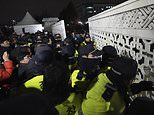
President Yoon Suk Yeol of South Korea made a dramatic declaration of emergency martial law today, accusing the political opposition of undermining parliament and denouncing ‘pro-North Korea, anti-state forces’ within the country.
The president’s unexpected late-night announcement led to unrest on the streets of Seoul, where agitated citizens clashed with riot police and security forces near the National Assembly.
South Korea’s military stated that under martial law, activities like parliamentary sessions and other political gatherings that could spark ‘social turmoil’ would be halted, with violators subject to arrest without a warrant.
In his address Yoon vowed ‘to protect the free Republic of Korea from the threat of North Korean communist forces, to eradicate the despicable pro-North Korean anti-state forces plundering the happiness of our people and to protect the constitutional order.’
‘With no regard for the livelihoods of the people, the opposition party has paralysed governance solely for the sake of impeachments, special investigations, and shielding their leader from justice… Through this martial law, I will rebuild and protect the free Republic of Korea, which is falling into the depths of national ruin,’ he said.
But the speech sparked an immediate outpouring of anger as disgruntled citizens marched on the capital’s parliament building.
Since taking office in 2022, Yoon had struggled to push his agendas against an opposition-controlled parliament, raising suspicions the sudden implementation of martial law was a political ploy to exercise greater power.
His popularity has also declined as of late amid various scandals in his inner circle, with the opposition seeking to impeach cabinet members over failure to investigate Yoon’s wife on corruption and influence-peddling allegations.
The move comes as a complete shock in the Western-aligned Asian nation of more than 50 million which despite escalating tensions with its foe to the North is not fighting an active war and has not suffered attacks on its soil.
Shocking images showing dozens of riot cops and armed police officers pushing back enraged rioters outside the National Assembly shortly after Yoon’s address was broadcast to the nation.
Meanwhile, news cameras captured the moment helicopters descended from the evening skies and landed on top of the parliament building before troops disembarked and began locking down the location.
Other footage and pictures later showed heavily armed soldiers in tactical equipment stalking through the hallways of the National Assembly. Parliamentary aides were seen trying to push the soldiers back by spraying fire extinguishers.
Yoon’s declaration drew immediate opposition from politicians, including the leader of his own conservative People Power Party, Han Dong-hoon, who called the decision ‘wrong’ and vowed to ‘stop it with the people.’
Opposition leader Lee Jae-myung, who narrowly lost to Yoon in the 2022 presidential election, called Yoon’s announcement ‘illegal and unconstitutional.’
South Korea’s Constitution says the president can declare martial law when it is considered necessary to cope with a military threat or to maintain public safety and order by mobilising military forces.
But it is not clear how long Yoon’s martial law declaration will stand.
When martial law is declared by the president, they must notify the National Assembly of the decision which can then take a vote on whether martial law should be upheld.
The president must comply when the National Assembly - where the opposition party currently holds a majority - requests the lifting of martial law by a majority vote of members.
The National Assembly, with 190 of its 300 members present, has already passed a resolution demanding the martial law be lifted, but Yoon has not yet made a statement in response.
Under martial law, the martial law commander, appointed by the president on the recommendation of the defence minister among active-duty generals, has the power to take actions related to arrests of persons, search and seizure, speech and the press, and assembly.
The commander has authority over all administrative and judicial matters.
‘All political activities, including those of the National Assembly, local councils, political parties, and political associations, as well as assemblies and demonstrations, are strictly prohibited,’ commander Park An-su said in a statement, adding: ‘All media and publications shall be subject to the control of the Martial Law Command.’
Thousands of doctors who have been striking for months over government plans to expand the number of students at medical school have also been ordered to return to work within 48 hours.
Yoon, a career prosecutor who was elected in May 2022 by a margin of less than 1%, has been unpopular, with his support ratings hovering at around 20% for months.
His People Power Party (PPP) suffered a landslide defeat at a parliamentary election in April this year, ceding control of the unicameral assembly to opposition parties that captured nearly two-thirds of the seats.
Yoon’s popularity has tanked in particular due to his dismissal of calls for independent investigations into scandals involving his wife and top officials – drawing quick, strong rebukes from his political rivals.
The President has repeatedly vetoed bills passed by the Democratic Party to appoint a special prosecutor to investigate alleged wrongdoings by his wife, including allegations of stock price manipulation before Yoon’s election.
The opposition has also sought to impeach cabinet members, including the government’s auditing chief, for failing to investigate the First Lady amid allegations of corruption and influence peddling.
Yoon’s declaration of martial law comes one day after the opposition Democratic Party - which has a majority in parliament - put forward a motion to impeach some of South Korea’s top prosecutors amid criminal investigations into their leader Lee.
The opposition sees the investigations as a political campaign against Lee who has been seen as the favourite for the next presidential election in 2027 in opinion polls.
Opposition MPs last week also slashed budgets that the government and ruling party had put forward for 2025.
In his stunning address this afternoon, Yoon declared: ‘Our National Assembly has become a haven for criminals, a den of legislative dictatorship that seeks to paralyse the judicial and administrative systems and overturn our liberal democratic order.’
He accused opposition lawmakers of cutting ‘all key budgets essential to the nation’s core functions, such as combatting drug crimes and maintaining public security… turning the country into a drug haven and a state of public safety chaos.’
Yoon went on to label the opposition, which holds a majority in the 300-member parliament, as ‘anti-state forces intent on overthrowing the regime’ and called his decision ‘inevitable’.
‘I will restore the country to normalcy by getting rid of anti-state forces as soon as possible,’ he said, asking his citizens to ‘believe in him’ and ‘tolerate some inconveniences’.
Yoon’s move is the first declaration of martial law since the country’s democratisation in 1987.
The country’s last previous martial law was in October 1979.
British nationals in South Korea have been advised to avoid political demonstrations after martial law was declared.
The UK Foreign Office issued new travel advice warning British nationals to ‘follow the advice of local authorities’ and ‘avoid political demonstrations’.
A Downing Street spokesman described the situation as ‘very fast-moving’ and said the Government was ‘closely monitoring developments in South Korea’ as he urged British nationals to keep an eye on the Foreign Office’s advice.
Meanwhile, US Deputy Secretary of State Kurt Campbell said Washington was watching events with ‘grave concern’ and had every hope and expectation that any political disputes would be resolved peacefully and in accordance with the rule of law.



